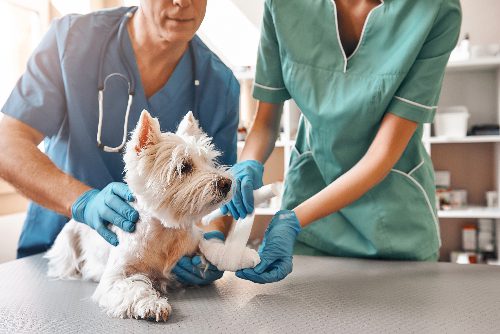Pets, like humans, can face health emergencies that require immediate attention. Recognizing the signs of a potential emergency can mean the difference between life and death for your furry friend. In this article, brought to you by Fetch Specialty & Emergency Centers, we’ll guide you through the key indicators that suggest your pet needs urgent veterinary care.

Understanding Pet Emergencies
Pet emergencies can range from apparent physical injuries to subtle behavioral changes. Be vigilant and aware of your pet’s normal behavior to detect deviations that might indicate a health crisis.
Severe Trauma or Injury
Suppose your pet has been hit by a vehicle, fallen from a height, or suffered a significant injury (including bite wounds, cuts, gun shot wounds). In that case, seeking emergency veterinary care immediately is crucial, even if they seem fine initially. Receiving care early on can lead to improved outcomes.
Difficulty Breathing
Labored breathing (defined as seeing the chest wall move at a faster rate or with more effort, involving the belly to breathe, stretching out the neck to improve airflow), choking sounds, or excessive coughing can be signs of respiratory distress and should be addressed urgently.
Seizures or Loss of Consciousness
While a single brief seizure might not be an emergency, repeated seizures (2 or more in a 24 hour period), prolonged seizures (lasting for more than 3-5 minutes), or prolonged time to return to normal behavior certainly are.
Ingestion of Toxic Substances
If you suspect your pet has consumed something poisonous, don’t wait for symptoms to appear. Seek emergency care right away. Common toxins include:
- Non-steroidal anti-inflammatories (NSAIDs)- human or veterinary- and other medications
- Xylitol (commonly in sugar-free gums)
- Anti-freeze
- Chocolate
- Macadamia nuts
- Onions and Garlic
- Lillies
- Daylilies, Asiatic/Easter, Lilly of the Valley, Peace Lillies, Peruvian Lillies
- Grapes/Raisins
- Sago Palm (any part of this plant can be deadly to dogs)
Sudden Collapse or Weakness
If your pet collapses or displays extreme weakness, it could indicate a severe underlying condition.
Severe Vomiting or Diarrhea
Continuous vomiting or diarrhea can lead to dehydration and other complications. This can be a sign of significant disease not only within the GI tract, but other organs of the body as well.
Your pet’s well-being is of utmost importance. Recognizing the signs of an emergency and acting promptly can save your pet’s life. Always trust your instincts; if something feels off, it’s better to be safe and consult an emergency veterinarian. The professionals at Fetch Specialty & Emergency Centers are always ready to provide the best care for your beloved pets during emergencies.
Frequently Asked Questions (FAQs):
Q: How do I know if my pet’s condition is an emergency?
A: Look for signs like severe trauma, difficulty breathing, seizures, ingestion of toxic substances, collapse, or severe vomiting. When in doubt, consult an emergency veterinarian like those at Fetch Specialty & Emergency Centers.
Q: My pet ate something unusual but seemed okay. Should I still see a vet?
A: Yes, some toxic substances may not show immediate symptoms. It’s always best to consult an emergency veterinarian to ensure your pet’s safety.
Q: How can I prevent pet emergencies?
A: Regular check-ups, pet-proofing your home, and awareness of common pet hazards can help prevent emergencies. However, always be prepared and know where to turn, like Fetch Specialty & Emergency Centers, in unexpected situations.
Q: What should I do while transporting my pet to an emergency vet?
A: Keep your pet calm and safely restrained in your vehicle. Place cats in a carrier for safety both in the vehicle as well as during the short trip from the vehicle into the veterinary clinic. Avoid giving any medications unless directed by a veterinarian.
About Us
Fetch Specialty & Emergency Veterinary Centers is a family-owned practice providing elevated specialty care, emergency medicine, and critical care in three convenient locations throughout Florida and South Carolina. Our board-certified veterinarians and highly skilled support staff all share a deep appreciation for pets, people, and the human-animal bond. We recognize how much you love your pet as a part of your family, and that’s why we love what we do!

